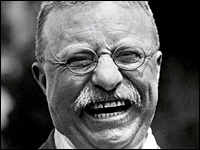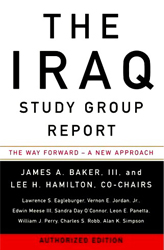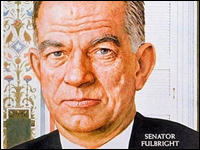In This Episode << SLIDE LEFT TO SEE ADDITIONAL SEGMENTS
Gary Dorrien: What Kind of Foreign Policy?
Foreign policy has fallen out of mind in recent weeks as the financial meltdown has vaporized our pensions and piled up economic wreckage all around us. But the choice between John McCain’s neoconservatism and Barack Obama’s liberal internationalism in foreign policy is as important as the differences between them on economic policy.
At the end of the 1980s a group of neoconservative policymakers and intellectuals began to argue that the time had come to create an American-dominated world order. Some of the neocons had positions in the administration of George H. W. Bush, where they were very frustrated. A larger number had served in the Reagan administration, where they opposed Ronald Reagan’s diplomacy with the Soviet Union. All were ideological conservatives, convinced of the power of ideas to change the world, who worried that Bush was not the right kind of conservative. Bush, in turn, felt the same way about them. The neocons owed most of their positions to Defense Secretary Dick Cheney, the only old-style, hard-line hawk in the administration’s top tier. Cheney and the neocons formed an alliance in the first Bush administration, one that had terribly real consequences in the second one.
The neocons responded to the end of the Cold War by espousing a foreign policy of global dominion. Some of them called it “unipolarism.” The defining purpose of American foreign policy, they argued, should be to prevent any nation or group of nations from becoming a great power rival. Having achieved global military and economic dominance, the U.S. needed to preserve it.
The early advocates of this vision were Paul Wolfowitz, Richard Perle, Charles Krauthammer, Norman Podhoretz, Ben Wattenberg, Joshua Muravchik, Frank Gaffney, Midge Decter, Michael Ledeen, and Zalmay Khalilzad. Podhoretz told me at the time that unipolarism was not really a new ideology; he had embraced it for years. But it was a new movement, he said, which would have to be led by younger neocons like Wolfowitz and Krauthammer.
In a turbulent, surprising, confusing historical moment, the neocons had a vision. Some of them distinguished between defending American superiority and assuming the burdens of a global Pax Americana. From the beginning there were key differences between the movement’s nationalistic realists and its democratic globalists. But all agreed that traditional Republican conservative realism was too cautious and stodgy to sustain America’s global supremacy.
For a while it appeared that the neoconservative vision would be confined to think tanks and magazines. After Bush lost the presidency in 1992, the neocons seemed to fade. Repeatedly they were declared to be finished in American politics. They were too ideological; they were stuck in a Cold War mentality; their only option was to blend into the Republican mainstream.
But neoconservatism persisted because the neocons had a more dramatic idea of politics than other kinds of conservatives, one that featured a radical, expansive faith in American power. The hallmark of neoconservatism was, and is, its radical faith that the maximal use of U.S. American power is good for America and good for the world. That is the basis of the longtime alliance between the neoconservative movement and John McCain.

Teddy Roosevelt |
In the mid-1990s, the neocons founded a new magazine, The Weekly Standard, and a new foreign policy think tank, the Project for the New American Century, and got a huge boost from the rise of the Fox television network. In 1997 they urged the Clinton administration to overthrow Iraq. Three years later most of the neocons supported McCain for president. McCain shared the core neocon belief that militarism is integral to the greatness of the nation. He and the neocons prized Teddy Roosevelt above all other presidents because of TR’s imperial spirit. McCain employed neocon advisers and attended neocon conferences. And he embraced the ideology of unipolarism.
But Wolfowitz and Perle worried that McCain might not win the nomination, and George W. Bush looked more electable to them, so they joined his campaign, which was helpful to other neoconservatives after Bush won the nomination. In September 2000 the neocons auditioned for positions in his administration by publishing a blueprint for a global empire strategy: repudiate the ABM treaty, build a global missile defense system, develop a strategic dominance of space, increase defense spending by $20 billion per year, establish permanent new forces in Southern Europe, Southeast Asia and the Middle East, and reinvent the U.S. military to “fight and decisively win multiple, simultaneous major theater wars.” They also remarked that it might take “a new Pearl Harbor” for Americans to realize the necessity of a global dominion strategy.
Since most of the neocons had backed McCain, and Bush was hard to read, they were not expecting a huge windfall of appointments. They thought they might get a dozen positions. Instead they got more than twenty-five. Vice President Cheney was the key to this incredible windfall; he was determined to exclude the realpolitikers who had frustrated him in the first Bush administration. Bush knew little about foreign policy, and his early policy was a patchwork of neocon and conservative realist positions. He expected to spend his presidency oscillating between the views of Wolfowitz and Condoleezza Rice, his foreign policy mentors during the campaign. But on September 11, 2001 Bush needed a worldview, he was surrounded by people who had one, and they were obsessed with invading Iraq.
Today a majority of Americans believe that the U.S. should not have invaded Iraq, but McCain fervently disagrees. He thinks overthrowing Iraq was a great idea that the Pentagon mismanaged. McCain is opposed to setting a departure date in Iraq; he is a true believer in the historic American myths of exceptionalism, Manifest Destiny, and supremacy; and his top foreign policy advisers are longtime neocons: Randy Scheunemann, Daniel McKivergan, and Marshall Wittmann. Though he says he would like to get out of Iraq, McCain is committed to occupying the country indefinitely in the name of waiting for “victory” and a stable unity government.
An Obama administration would adopt some version of the Baker-Hamilton Commission approach, which advocated pulling back to air, ground, and naval deployments in Kuwait, Bahrain and other bases in the Middle East while maintaining some residual U.S. forces in Iraq to fight terrorism, protect the U.S. embassy, and stabilize the Kurdish region. Even the Bush administration has belatedly opted for a version of the latter approach.
The Bush plan has some problems, beginning with the fact that the Maliki government is balking at endorsing it. The time frame of the Bush plan is six months longer than the one proposed by Obama; it allows the Iraqi government to extend the time line; it rests heavily on an interim U.S. withdrawal to bases outside Iraqi cities by June 2009; it does not relinquish U.S. military bases by a time certain; it does not require that human rights standards will be upheld for Iraqi detainees; and it contains no protection against sectarian policing and prison procedures.
I believe that something like the Hamilton Commission approach is the best we can get in the short term, but I would press hard for getting the U.S. military footprint down to a minimum in Iraq and the entire Middle East, and I would expect an Obama administration to strengthen the human rights provisions in the current agreement.
 The U.S. needs to return to a police model of counter-terrorism that operates through the force of law and international cooperation. In my book Imperial Designs (2004) I showed that neoconservatives mapped out the Bush Doctrine in the 1990s. Before 9/11, Bush was on board for unipolarism, spurning the world court and the military doctrine of “full spectrum dominance,” and he flirted with a neocon line on Iraq. After 9/11 he adopted the rest of the neocon playbook, except for China policy: unilateral regime change, preventive war, perpetual war, and denigrating the police model.
The U.S. needs to return to a police model of counter-terrorism that operates through the force of law and international cooperation. In my book Imperial Designs (2004) I showed that neoconservatives mapped out the Bush Doctrine in the 1990s. Before 9/11, Bush was on board for unipolarism, spurning the world court and the military doctrine of “full spectrum dominance,” and he flirted with a neocon line on Iraq. After 9/11 he adopted the rest of the neocon playbook, except for China policy: unilateral regime change, preventive war, perpetual war, and denigrating the police model.
For months neocons were frantic that Colin Powell was not on board. Powell talked about coordinating international police action against Al Qaeda and working through the United Nations. Neocons attacked him ferociously, contending that Powell was stuck in the outmoded counterterrorism of the past. Repeatedly they demanded that Powell had to accept the president’s policy of unilateral war or get out of the administration. In January 2003 Bush gave Powell the same choice, telling him to put on his war uniform.
Today Powell probably wishes he made a different choice. Invading Iraq was a supercharger for terrorism. As a nation we need to return to Bush’s original mistake of elevating counter-terrorism to the level of perpetual global war. I believe the liberal internationalist commitments to democracy, cooperative problem solving, human rights, and building structures of collective security are indispensable to a good foreign policy. These beliefs are compatible with the realist view that all states are self-interested and power-seeking. The case for a stronger international community has a realistic basis, that the benefits of multilateral cooperation outweigh the costs and risks of not working together. A superpower that insists on absolute security for itself makes all other nations insecure. All parties are better off when the most powerful nations agree not to do everything that is in their power and nations work together to create new forms of collective security. In an increasingly interdependent world, nation-states have to cooperate with each other to address security issues that transcend national boundaries.
We need to get out of Iraq, create an international peacekeeping force there, and relinquish U.S. control of the military bases. We need a peace movement that is pledged to cooperation, multilateralism, human rights, and creating structures that transcend nationalism. We need a foreign policy that holds out for a two-state solution in Israel/Palestine with borders approximately along the Green Line, and that supports and strengthens the United Nations, doubling the Security Council and getting rid of the veto power on the Security Council. A United Nations without the veto power would have rescued the devastated people of Myanmar this spring, instead of kowtowing to China.
I believe that installing thousands of U.S. troops anywhere in the Middle East is a recipe for disaster. The U.S. has two strategic objectives in the Persian Gulf: to protect its allies and secure its oil interests. It can do these things without stationing troops on the ground. Obviously the U.S. needs to break its addiction to Persian Gulf oil, but that is not happening. And the U.S. will surely step up its fight against Al Qaeda in Afghanistan, which has suffered from the draining occupation of Iraq. But concerning the two strategic objectives, both are best served by maintaining a strong naval presence in the Indian Ocean and some naval forces in the international waters of the Persian Gulf. The main thing is to make sure that ships get through the Strait of Hormuz. That can be done by stationing forces in the Indian Ocean and at bases outside the Middle East. In other words, the U.S. could go back to the policy it had in the 1980s after it lost Iran.
In the 1980s the U.S. was locked in a Cold War with the Soviet Union, and it faced adversaries in the Middle East that were armed militarily by the Soviets. And yet, despite these threats, U.S. leaders were sufficiently chastened and wise to avoid inflaming anti-American feeling in the Middle East. We need to recover that sensibility and improve upon it.
On September 11, 2001, and for weeks following, the U.S. had a precious opportunity, a moment with new possibilities. Not since the end of World War II had there been such a moment when a huge step forward was possible toward building a community of nations. If the U.S. had responded to 9/11 by sending NATO forces and Army Rangers after al Qaeda, rebuilding Afghanistan, and creating new networks of collective security against terrorism, it would have gained the world’s gratitude. Instead it took a course of action that caused an explosion of anti-American hostility throughout the world, a torrent of bitter feeling that has not abated.

Senator William Fulbright |
Forty years ago, Senator William Fulbright warned that the U.S. was well on its way to becoming an empire that exercised power for its own sake, projected to the limit of its capacity and beyond, filling every vacuum and extending American force to the farthest reaches of the earth. As the power grows, he warned, it becomes an end in itself, separated from its initial motives (all the while denying it), governed by its own mystique, projecting power merely because we have it. That’s where we are today.
After Obama is elected president, we will need a peace movement as much as ever. We will need a movement that says, “I don’t want my country to invade any more nations in the Middle East. I don’t want my country to be dragged into wars that don’t come remotely close to being a last resort, inflaming resentments that will last for centuries. I don’t want my country to plant permanent military bases for itself anywhere in the Middle East. Not in my name do you invade any more Muslim nations in the name of making America safe.”
–Gary Dorrien is the Reinhold Niebuhr Professor of Social Ethics at Union Theological Seminary and professor of religion at Columbia University.






